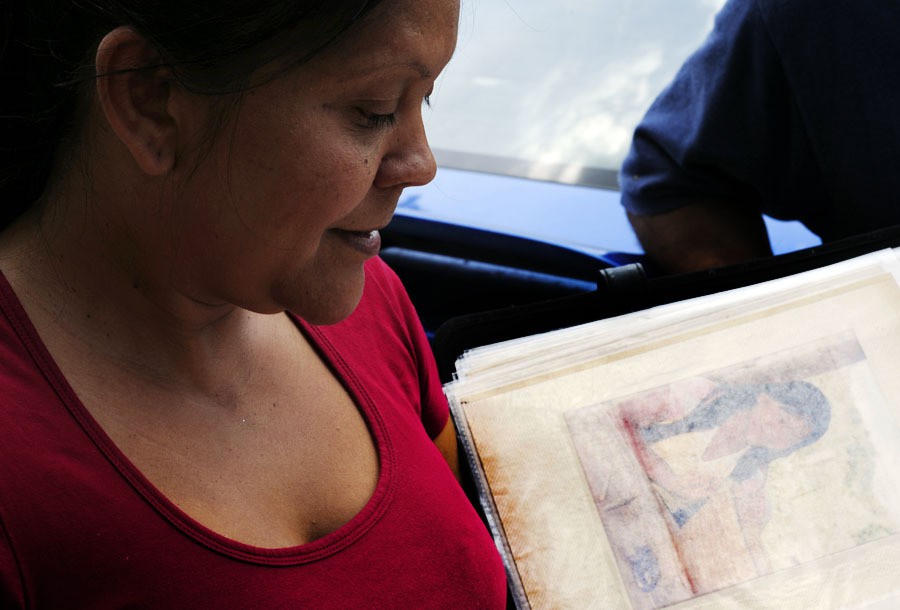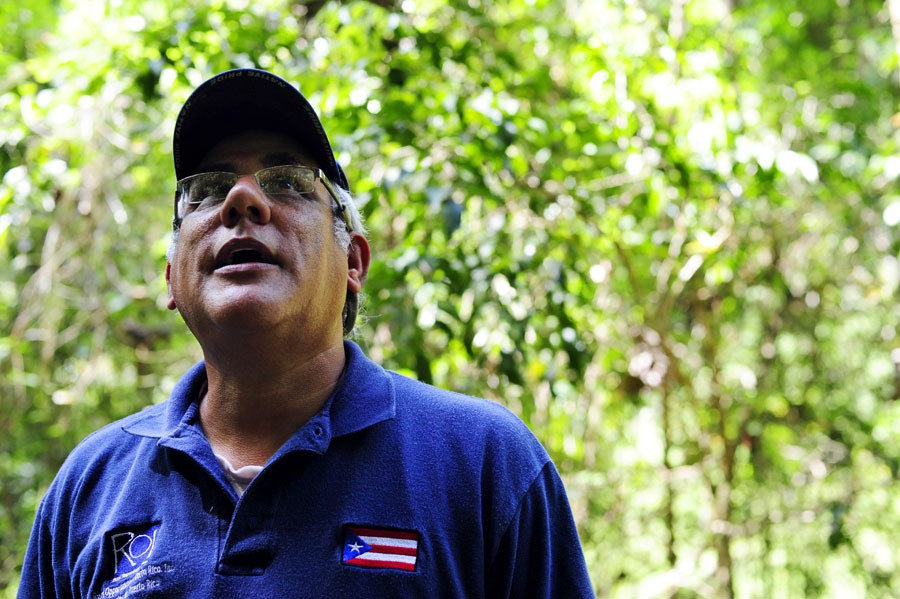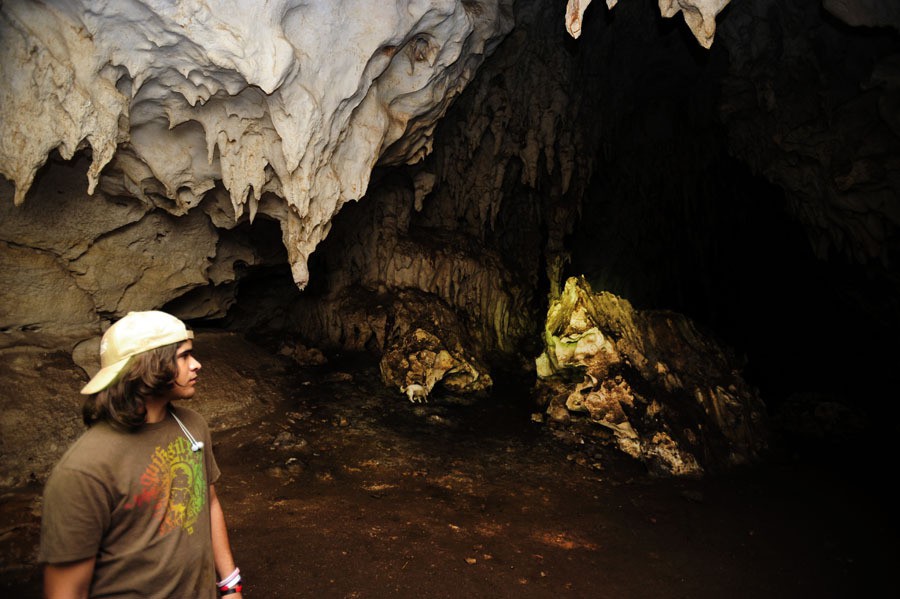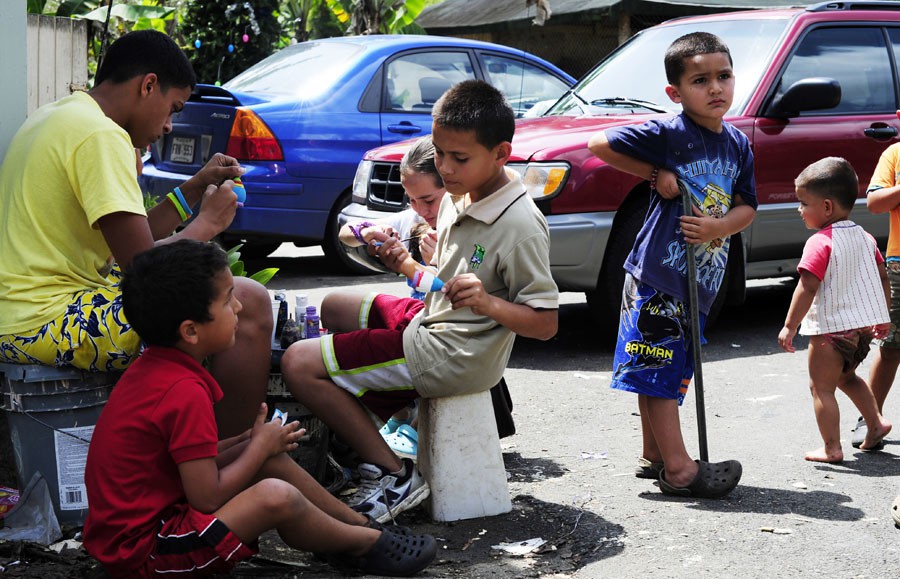Statehood Issue Stirs Passions About Puerto Rican Identity
By Kailey Latham
Cronkite Borderlands Initiative
SAN JUAN, Puerto Rico -- What does it mean to be Puerto Rican?
For over 500 years, the people of this island have struggled with the answer to that question. This November, the question will follow them into the voting booth.
As the rest of the United States goes to the polls to elect a new president, the big issue for Puerto Ricans, who are U.S. citizens but can't vote for president unless they live in a U.S. state, is whether to vote for a change in their territorial status. They can decide to remain as they are, become an independent nation, or apply to become the 51st U.S. state. If statehood wins at the polls Congress will eventually have to decide Puerto Rico's political fate.
But much more than meets the eye rides on the vote. The question on the ballot goes to the heart of what it means to be Puerto Rican. A question that has hung over the island since the U.S. acquired it in 1890.
These days, citizenship links Puerto Ricans to the United States on paper but culture and history separate the two.
"Puerto Rico is not a nation-state, not an independent … country, but still it has its own history, language, territory, culture and autonomy," said Jorge Duany, a dean and anthropologist at the University of Puerto Rico at Rio Piedras. "And perhaps more importantly, the awareness people do have of being separate from other people of the world, including the United States."
Dual Governments, Two Flags, and the Ultimate Identity Crisis
President Woodrow Wilson signed the Jones Act on March 2, 1917, granting U.S. citizenship to Puerto Ricans, but 95 years later the territory and the world are still perplexed by this political relationship.
Two national flags symbolically represent Puerto Rico, and the U.S. and Puerto Rican flags traditionally fly side-by-side. Juan Manual Carrion, a professor at the University of Puerto Rico, says that flying both flags next to each other eliminates the fear some Puerto Rican people have of autonomy.
"When the Puerto Rican flag flies alone it's practically unavoidable to prevent it from becoming a symbol of nationalism," he said. "Together with the American flag, the Puerto Rican flag is tame."
The flag that represents the commonwealth of Puerto Rico was originally created to be a symbol of Puerto Rican independence but today it is seen as a symbol of ethnic pride.
"Ethnic pride is just like a very ambiguous frontier between expressing your ethnic pride and presenting a demand for self-rule," Manuel said.
Manuel feels that the coexistence of these flags creates a living contradiction.
"We want to eat our cake and have it too," he said. "To be able to express our ethnic national pride, while at the same time maintaining our link with the strongest country in the world."
For many Puerto Ricans, the flags are just the beginning of this political tug-of-war.
Gabriela Joglar Burrowes, a senior at the University of Puerto Rico, says that she has faced challenges in defining her national identity to outsiders.
"It's always difficult for me to defend that I am Puerto Rican when I have a passport that says U.S.A.," Joglar said.
Miguel Rodriguez, director of the Center for Advanced Studies of Puerto Rico and the Caribbean, says that despite the identity crisis, U.S. citizenship provides the Puerto Rican people economic and political advantages.
"To be an American citizen is safety," Rodriguez said. "If you have that identification passport, you will be safe in the world, safe from enemies."
Manuel agrees that U.S. citizenship provides Puerto Ricans access to many things but he believes that Puerto Rico's ethnic identity still remains present.
"It has survived more than 100 years under U.S. control, and to be directly under the influence of the U.S. is a very strong thing," Manuel said.
Puerto Rico has managed to make a name in international competitions, where it competes as a sovereign nation, with five Miss Universe winners and a well-known basketball team. Duany, the anthropologist and dean at the University of Puerto Rico, says that this success has been very meaningful to the island.
"Beauty contests and sports representation may not be significant in other places but here they are because they are the only expressions of cultural identity that have an international projection," Duany said.
Even with these triumphs, Andrew Vasquez, a student at the University of Sacred Heart, feels that Puerto Ricans walk a very fine line when it comes to national identity.
"We are constantly being torn between where we start being Puerto Rican and where we start being a U.S. citizen," he said.
Vasquez believes that the daily contradictions pile up over a lifetime and create reservations within the hearts and minds of the Puerto Rican people.
"You come to this point where you doubt what you should answer; am I Puerto Rican or am I American?" he said.
Vasquez believes that the question can only be answered by an individual based upon his or her own experience.
"If I say that I am Puerto Rican, I am not denying anything else," he said. "I am just reaffirming what I believe that I am."
Vasquez says that merging the two unique cultures completely will be impossible.
"The social movements that gave birth to your culture are very different than the ones that gave birth to my culture," he said.
Rodriguez, the director of the center for Advanced Studies, agrees, adding there is no feeling of unity between the two cultures. He believes that in Puerto Rico there is no real feeling of being American.
"It is not that we are Americans because we are not Americans," Rodriguez said. "They are Americans. We are Puerto Ricans. We have (American) citizenship."
The right to politically self-identify is valued by many Puerto Ricans but, for a growing number, the question of cultural identity dates to the pre-Columbian era.
A Forgotten People and a Revival of Culture
In 2010 approximately 20,000 Puerto Ricans identified solely as American Indian on the U.S. Census. This was an increase of 49 percent from the 2000 census, sparking an interest in what academics are calling the "Taino revival."
Taino Indians were the first group of people on the island of Boriken (the Taino word for Puerto Rico), and were believed to be extinct following the Spanish conquest of the Caribbean island. But in the past few decades, many Puerto Ricans have openly identified as Taino.
The Institute of Puerto Rican Culture in the 1940s and 50s promoted the Taino culture as one of three roots in the Puerto Rican heritage -- Taino, Spanish and African.
Although it was commonly agreed that Taino Indians were the forefathers of the Puerto Rican people, their indigenous history, culture and language were minimally discussed until the early 21st century.
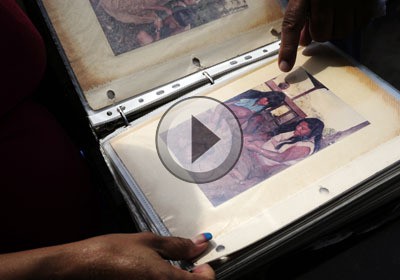 SLIDESHOW: The Taino Indians are the native tribe in Puerto Rico. Many of the island's Taino tribal members are fostering a resurgence of traditional values and identity. |
Dr. Juan Martinez Cruzado, a geneticist at the University of Puerto Rico at Mayaguez, has found through a U.S. National Science Foundation study that over 60 percent of all Puerto Ricans have Taino blood.
"Now we have this revival of people, some people who not only accept that we can have some Taino blood, but people who try to revive traditions, even names and daily activities," Miguel Rodriguez said.
Roger Guayakan Hernandez, the director of the Boriken chapter of the United Confederation of Taino Peoples, says that the Taino community has faced a lot of discrimination in Puerto Rico, but in recent years it has worked to change the negative societal perception.
"We had to almost undo the stigmatism and confusion that was surrounding our people," he said.
Now Hernandez believes that the Taino community is in a fight for their right to self-identify.
"I guess it could be basically a war for civil rights, almost a revolution for civil rights," Hernandez said.
Hernandez faced a lot of backlash while he was growing up from friends and family after he decided to connect with his indigenous heritage, and now as an adult he feels that people should feel pride in identifying as Taino.
"I think that is something now that ought to be celebrated based on what I have seen in my own lifetime, in my own family, in my own neighborhood where people were afraid and ashamed of saying they were Indian," he said.
Despite the research and statistics, many academics and Puerto Ricans remain skeptical about this new indigenous movement.
"Sometimes it is very difficult to differentiate someone who claims to be Taino except that they perhaps have a physical type, but then that's also part of the controversy," said Duany, the dean at the University of Puerto Rico.
Duany said that most Puerto Ricans are unsure if the Taino identity has to do with physical appearance, heritage or choice, and this confusion has complicated the movement.
But Hernandez argues he and others should not have to explain their reasoning for identifying with this culture.
"Why is that if I have one drop of African blood in me, then I can be considered African?" he said. "But in order to be recognized as an Indian, I have to have 100 percent indigenous blood?"
Hernandez believes that no matter how Tainos choose to identify themselves, someone will have a problem with it.
"If I say one thing or another, people will perceive that in the wrong way," he said. "They'll decide on their own terms what they think of me, regardless of how I identify myself."
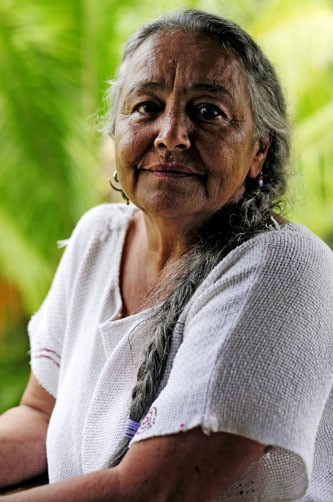
Naniki Reyes Oscario, a Taino Indian elder in Puerto Rico, poses for a portrait outside her home in the central mountains. Oscario said she is frustrated because despite cultural and historical recognition as an indigenous community, the Taino nation is not federally recognized by the governments of the United States and Puerto Rico. Photo by Brandon Quester |
In spite of the cultural and historical revival, the U.S. and Puerto Rican governments do not officially recognize Tainos as an indigenous tribe or nation. This has frustrated Hernandez, as well as Naniki Reyes Oscario.
Reyes, an elder in the Taino community, is especially frustrated with the desecration of indigenous sites including burial grounds in Puerto Rico. She says this destruction is another example of how both governments do not value the Taino community.
"We are still not human," she said. "If you don't see me as a human being, you don't see me as someone you have to respect."
Although Hernandez does not take a stance on the future of Puerto Rico's status as a territory or potentially the 51st state, he acknowledges that statehood could force the Puerto Rican government to protect these burial sites.
"If Puerto Rico becomes a state, I think there will be a greater interest on federal statutes for Indian rights," he said.
Both Reyes and Hernandez agree that the future of the Taino community in Puerto Rico rests in the hands of the younger generation, who are now getting involved in the movement.
"A lot of younger people here in Puerto Rico are beginning to explore their indigenous heritage, because there is simply more information available now," Hernandez said.
Reyes, who was born and raised in New York City for 12 years, says it is challenging for the younger generation to learn about their heritage, and the barriers to self-identity obscure this even further.
"Children are not rooted in who they are, so then they are very easily swayed," she said, "We are losing our children with the loss of our culture."
Miguel Rodriguez, of the Center for Advanced Studies, says that he supports students in his school who practice Taino cultural traditions.
"It is okay to practice those things," he said. "We are all Puerto Ricans, but we have different legacies."
Rodriguez says that he sees the Taino influence today in language, food, art and appreciation for natural resources.
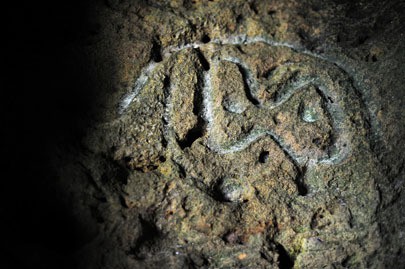
Hidden in a series of caves on the western shoreline of Puerto Rico, historic carvings like this one, mark the existence of the indigenous Taino Indians. Photo by Brandon Quester |
Today, Taino art can be seen and purchased throughout the island, and many of the indigenous cave sites have become tourist destinations.
Despite the culture's visibility in the territory, Rodriguez says identifying as Taino has become comical in some circles.
"They joke about that," he said. "It has not been accepted in Puerto Rico—in the cultural community and in the intellectual community."
Hernandez says that it is difficult to identify as Indian when your family and your community has faced persecution.
"What advantage is it to me?" he said. "I think when a person identifies themselves as being Indian, I think it is something that should be respected."
The desire for respect and the freedom to racially self-identify is not isolated to the Taino community. In fact, racial identity has been an impediment for thousands of Puerto Ricans over the past decade.
Puerto Rican Racial Identity and the U.S. Paradigm
Under the leadership of Gov. Luis Munoz Marin, Puerto Rico in 1960 removed the racial identification question from the territory's version of the U.S. census. The U.S. Census Bureau and the Puerto Rico Planning Board worked together to develop a specific census that met the needs of the territory, and did not include stateside topics such as race and Hispanic origin.
Professor Juan Manuel Carrion, from the University of Puerto Rico, says that this change is representative of a traditional view about race on the island.
"The governments of Puerto Rico and of the Popular Democratic Party defended that on the idea that we are all Puerto Rican here, we don't make distinctions about race," Manuel said.
The race question remained off the Puerto Rican version of the census until 2000, when the Puerto Rican government sent a letter to the U.S. Census Bureau requesting to receive the same decennial census that is distributed within the continental United States.
However, the reinstatement of this question has posed some challenges because racial categories in the United States are not reflective of the racial identities used in Puerto Rico.
In 2010, approximately 76 percent of the Puerto Rican population identified as 'white' and 12.4 percent identified as 'black.'
"If you took the more recent census statistics seriously, Puerto Rico would look more like a Scandinavian country than a Caribbean country in terms of the large proportion of people that have African origin and are not reflected in the census," Duany said.
Milagros Denis-Rosario, a professor at Hunter College at the City University of New York, says that the racial identification question does not provide Puerto Ricans on the island the flexibility to identify using the terms they are familiar with.
"There are race categories in Puerto Rico, but people self-define," she said. "It's not like the U.S., like a binary system where you are black or white. But on the island, there is this flexibility."
Manuel agrees, saying that race is more than black and white in Puerto Rico; it is about the shades in between.
"According to North American criteria, all Puerto Ricans would be black no matter how light their skins are," Manuel said.
Duany says that because the census has been translated from the U.S. version it has created a big issue for Puerto Ricans who may not understand where they fit in.
"Every 10 years, Puerto Ricans get their census questionnaire and they have to figure out exactly how to fill out the form," he said.
Vasquez, the student from the University of Sacred Heart, says that racial distinctions in Puerto Rico are not as important as they are in the United States. He feels that the census is an effort to make Puerto Ricans fit within a mold that they never came from.
"All of this really boils down to is that we don't give such an importance to race, because at the end of the day we are all Puertoriquenos," Vasquez said. "I don't care what your color is, or where you come from. What I care about is that we have a common cultural background."
Vasquez believes that Puerto Rico's mixed heritage is the reason why racial differences are not a concern for the Puerto Rican people.
"Even from within the family nucleus we are always sharing space with someone that looks different, and when you are sharing space with someone that looks different than you, those differences start melting away and you don't see them anymore," he said.
Joglar Burrowes, the student from the University of Puerto Rico, agrees as she has witnessed these sentiments in her own family.
"I am white, but my grandparents are more dark," Joglar said. "They are almost black. It is almost like we are not very defined. I may look white, but I don't feel like it."
Manuel says the same racial pride you find in the United States cannot be found in Puerto Rico.
"If you think that is something that should be cultivated at least for some racial categories, then the situation in Puerto Rico is not very likeable," he said.
While Barack Obama in 2008 made history as America's first black president, Luis Lopez Salgado, a senior at the University of Puerto Rico, says the President wouldn't necessarily be considered black in Puerto Rico.
"Here, he wouldn't necessarily be deemed black," Lopez said. "He would be called mixed race, because he is mixed race. If he were competing for governor here, there wouldn't be that much attention paid to his racial identity."
Lopez says that the issue of race on the census is one huge problem without a solution.
"I think it's kind of absurd to ask people to identify themselves," he said. "It's very a personal thing how you identify yourself, and it should be left up to the person. Not fill out whatever category you think because what you think you are may not even be in those categories."
With all of Puerto Rico's challenges in defining identity, the upcoming election season has added extra pressure on the people of this nation to let the world know exactly who they are.
Identity a Possible Roadblock to Statehood
In the previous three votes on Puerto Rico's status, statehood has lost every time. Many credit this to Puerto Rico's strong cultural identity.
"I think maybe the explanation on why statehood has lost three plebiscites is perhaps the feeling that; okay I want the connection to the U.S. because of U.S. dollars, the U.S. passport, but I still want to be Puerto Rican and statehood could really be the end of that," said Juan Manuel Carrion, professor at the University of Puerto Rico.
Manuel says that the Puerto Rican government has failed to preserve the island's distinctive cultural identity since the 1950s, and this could be the result of the territory's pending political status.
"All their effort is to be more and more like the U.S., and they know this strong Puerto Rican ethno-national identity is their main obstacle to achieve statehood," he said. "So their whole purpose is to destroy that."
Luis Lopez Salgado, a student at the University of Puerto Rico, says that he feels statehood could be dangerous to the Puerto Rican identity.
"I think there is going to be a lot of whitewashing of the culture that we have," Lopez said. "I think kind of a deleting of our own identity and who we are as a people."
Manuel says that Americans' effort to brand the United States as a place of multiculturalism is forced and hypocritical.
"If they really accepted diversity, than they would accept Puerto Rico just as it is," Manuel said, "But that's really impossible, because to accept Puerto Rico as it is would be the U.S. accepting a transformation, a change in the very definition of what is America."
Manuel says that if the U.S. is to accept Puerto Rico as it is and allow it to become the 51st state, then it may show that other culturally distinctive, Spanish-speaking states can exist within the United States.
"I think Americans have reason to worry that, that might be too much of a disunity, a possible break-up of the U.S. because the ethnic factor just cannot be tamed, just cannot disappear by decree," he said.
Back to Top
